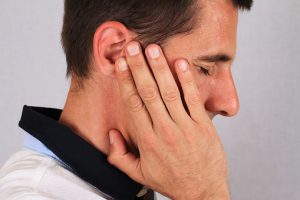
The exact cause of Meniere’s disease is unknown, but there are factors that increase a person’s risk of developing the condition. These risk factors include increased pressure of the fluid in the endolymphatic sac and allergic factors damaging the inner ear. Still, the exact association between these risk factors and Meniere’s disease pathogenesis is not fully understood.
Anyone can develop Meniere’s disease, but it commonly occurs in those aged 20 to 50 years. Roughly seven to 10 percent of patients have a family history of Meniere’s disease, and incidence rates among the population are between 1:1000 and 1:2000. Both men and women can develop Meniere’s disease.
Tinnitus is persistent ringing of the ears even in the absence of sounds. This can negatively impact your quality of life, keeping you up at night, making hearing difficult, and being overall annoying.
Tinnitus is common in Meniere’s disease, and may be the key symptom indicating an impeding diagnosis of this condition. Tinnitus in Meniere’s disease may fluctuate, causing greater ringing and buzzing on some days than others. Many Meniere’s disease patients describe tinnitus as a “roaring” sound.
Detecting tinnitus early on can help you get an early diagnosis for Meniere’s disease. Although there is no cure for either condition, there are treatment options to manage the symptoms and improve the quality of life.
Stages of Meniere’s disease
There are three main stages of Meniere’s disease: early, intermediate, and late.
The early stage is characterized by frequent, sudden attacks of vertigo that may last for a few minutes or even several hours. During these attacks, one may experience hearing loss along with a feeling of fullness in the ears. Tinnitus may also take place either during or after a vertigo attack.
The intermediate stage of Meniere’s disease involves vertigo attacks, tinnitus, and hearing loss. While vertigo attacks are less severe than in the early stage, hearing loss may become permanent and tinnitus gets more predominant.
The late stage comes with hearing loss, balance difficulties, and tinnitus. Hearing loss is much greater at this point, but vertigo attacks get weaker or cease altogether. The damage to the ear could contribute to balance problems, which become worse in the dark.
Difference between tinnitus and Meniere’s disease symptoms
Although tinnitus may be a symptom of Meniere’s disease, there are other key symptoms that distinguish the two conditions. Here is a symptom chart of tinnitus and Meniere’s disease to help you recognize these key differences.
| Attribute | Tinnitus | Meniere’s Disease |
|---|---|---|
| Sensation of ringing in the ear(s) | Yes | Yes |
| Hearing loss | Not necessarily | Yes |
| Pressure in ear | Not necessarily | Yes |
| Vertigo | No | Yes |
| Number of sufferers | Estimated 50 million Americans | Estimated 615 thousand Americans |
| Most common cause | Exposure to loud noise | Fluid buildup |
| Treatment options | Ring relief, sound maskers, Ask your doctor | Diet changes, medication |
| Is there a cure? | Not yet | Not yet |
| Where can I find more information? | American Tinnitus Association | Vestibular Disorders Association |
*Source: The Relief Products
Treatment options to reduce the symptoms of Meniere’s disease
As mentioned, there is no cure for Meniere’s disease, but treatments are available to help alleviate the symptoms and improve the quality of life. For starters, your doctor may prescribe you medications to help control your vertigo. These may include motion sickness medications and anti-nausea medications.
Your doctor may also prescribe diuretics to help you expel excess fluid your body may be retaining. For optimal results, stick to a low-salt diet.
Other therapies that may help manage the Meniere’s disease symptoms include rehabilitation for balance problems, hearing aids, middle ear injections, and meniett device, which applies pressure to the inner ear to improve fluid exchange.
Lastly, surgery may also be an option for Meniere’s disease to assist with vertigo.
Working with your doctor can help you choose the most appropriate treatment for your Meniere’s disease symptoms.
Related: Tinnitus treatment: Therapies and exercises to manage ringing in the ears